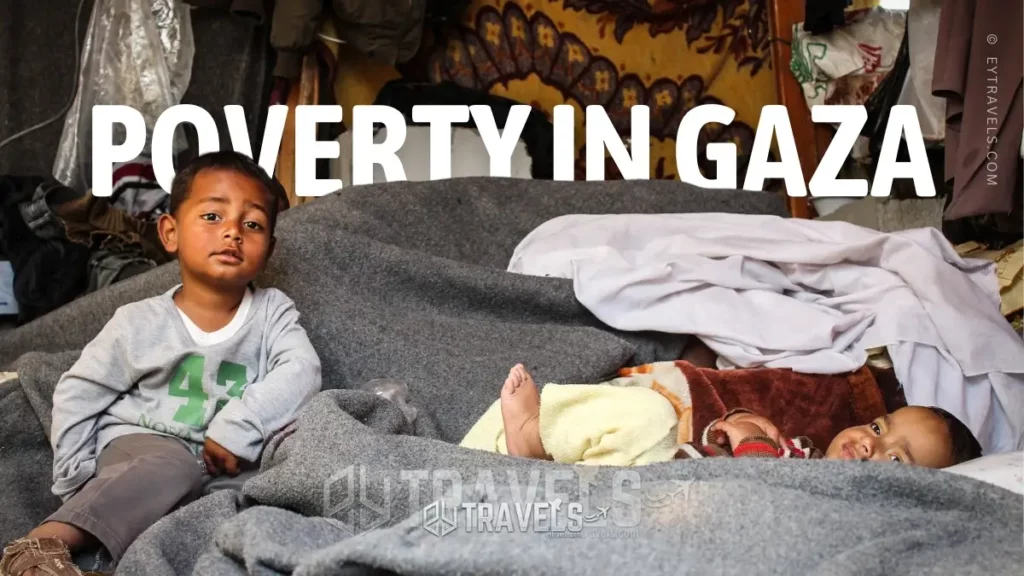Uncovering Injustice: Hard Truth About Poverty in Gaza, Palestine
The Untold Stories: Inside Look at Poverty Struggles in Gaza
Unveiling the layers of hardship in Gaza unveils a harsh reality – poverty looms over its residents with unwavering persistence. Beyond the headlines, beyond statistics, lies a complex tapestry of struggles that demand our attention. Understanding the hard truths about poverty in Gaza is not merely an exercise in empathy; it is an urgent call to action for change and justice.
Table Of Contents
- Gaza Residents Live In Poverty
- History of Poverty in Gaza
- Access to Basic Necessities In Palestine
- Unemployment and Economic Struggles in Gaza
- Humanitarian Aid and Assistance Programs
- Psychological Well-being In Gaza
- Education and Opportunities for Youth
- Role of International Community in Alleviating Poverty in Gaza
- Sustainability Solutions for Combating Poverty in Gaza
- Moving Towards a Brighter Future
- Final Thoughts
Gaza Residents Live In Poverty
In the shadow of conflict and turmoil, Gaza stands as a testament to resilience amidst adversity. The poverty situation in this region is not just a number on a chart; it is the daily reality faced by families, children, and individuals striving for dignity and hope.
As we navigate through these hard truths about poverty in Gaza, we uncover profound insights into the human spirit's endurance amid unimaginable challenges. This exploration transcends borders and biases, beckoning us to delve deeper into the complexities of poverty's grip on a community fighting for survival.
History of Poverty in Gaza
The history of poverty in Gaza is a complex tapestry woven with political unrest, economic hardships, and humanitarian crises. Dating back decades, Gaza has grappled with escalating levels of poverty due to a myriad of factors. One key contributor to the deepening poverty crisis in Gaza is the Israeli blockade imposed on the region since 2007, severely restricting the flow of goods, services, and people in and out of the territory. This blockade has stifled Gaza's economy, making it challenging for businesses to thrive and for residents to access essential resources.

Moreover, recurrent conflicts with Israel which have ravaged infrastructure, disrupted daily life, and exacerbated economic instability. The devastation caused by wars not only leads to immediate loss of lives but also leaves lasting effects on the region's economy. For instance, during the 2014 conflict between Israel and Hamas, thousands of homes were destroyed or damaged, plunging families deeper into poverty as they struggled to rebuild their lives amidst widespread destruction.
The impact of political conflicts on the economic stability of Gaza cannot be overstated. With limited opportunities for growth and development due to ongoing tensions, many Gazans find themselves trapped in a cycle of poverty that becomes increasingly difficult to break. The lingering effects of past conflicts reverberate through generations, creating a bleak outlook for many residents who are yearning for sustainable solutions that can uplift them from the grips of destitution.
Understanding this historical context is crucial in comprehending the challenges that Gaza faces today and why addressing poverty in this region requires multifaceted approaches that transcend mere band-aid solutions.
Access to Basic Necessities In Palestine
In the enclave of Gaza, access to basic necessities like clean water, healthcare, and education remains a constant struggle for its residents. The scarcity of resources in Gaza has led to water shortages, with over 96% of the water supply deemed unfit for human consumption by the World Health Organization. This dire situation not only poses health risks but also exacerbates existing challenges faced by impoverished Gazans. Limited access to healthcare facilities further compounds these issues as hospitals in Gaza are often overwhelmed and under-resourced due to years of conflict and economic hardship.
Moreover, the education system in Gaza suffers from a lack of funding and proper infrastructure, hindering the ability of young people to receive quality education. Many schools operate under capacity, lacking essential materials and trained teachers. Families living in poverty find it increasingly difficult to afford educational expenses such as uniforms or transportation costs, depriving children of their right to learn. As a result, generations in Gaza are trapped in a cycle where limited access to education deepens the roots of poverty within the community.
The combination of these challenges creates a vicious cycle for Gazan residents who struggle daily to meet their basic needs. High levels of poverty restrict individuals from breaking out of this cycle as they grapple with inadequate access to essential services. Urgent intervention is required to address these systemic issues and ensure that every person in Gaza has the fundamental rights to clean water, healthcare, and education. By shedding light on these harsh realities, we can work towards solutions that empower Gazans with the resources they need for a dignified life free from poverty's grip.
Unemployment and Economic Struggles in Gaza
In Gaza, high unemployment rates perpetuate the cycle of poverty, leaving many residents struggling to make ends meet. With limited job opportunities, individuals face significant economic hardships that further deepen their precarious financial situations. The lack of stable employment not only impacts the individual's ability to meet basic needs but also contributes to the overall financial instability of the region. The youth population is particularly affected by this issue, as they face barriers to entering the workforce and building a stable future.
Efforts to improve job opportunities for Gazans are crucial in breaking the cycle of poverty in the region. Initiatives focusing on skills training, entrepreneurship development, and job creation play a vital role in providing individuals with the tools needed to secure sustainable employment. Organizations like the United Nations Development Programme (UNDP) have implemented projects aimed at promoting economic growth and creating job opportunities for Palestinians in Gaza. By investing in vocational training and supporting small businesses, these programs strive to empower Gazans economically and reduce dependence on aid.
Despite facing considerable challenges, there are success stories emerging from Gaza that highlight the resilience and determination of its residents. Individuals who have accessed training programs or started their own businesses showcase how economic empowerment can lead to positive outcomes within communities grappling with poverty. These success stories underscore the importance of ongoing efforts to address unemployment issues and create pathways for sustainable livelihoods in Gaza, ultimately offering hope for a brighter future amidst adversity.
Humanitarian Aid and Assistance Programs
In the midst of dire poverty in Gaza, humanitarian aid organizations play a crucial role in providing essential relief to the impoverished residents. These organizations often step in to fill gaps left by economic hardships and conflict, offering much-needed assistance ranging from food and shelter to healthcare and educational support. Despite facing significant challenges due to the volatile political climate in Gaza, these aid agencies continue their efforts to alleviate suffering and improve the living conditions of those most vulnerable.
One such example is the work of the United Nations Relief and Works Agency for Palestine Refugees (UNRWA), which operates schools, clinics, and emergency programs in Gaza. UNRWA not only provides immediate relief but also focuses on long-term development projects aimed at sustainable solutions for poverty alleviation. However, delivering aid in Gaza is not without obstacles; restrictions on movement, limited access to resources, and security concerns often hinder the efficiency of aid distribution efforts. This highlights the resilience required by humanitarian organizations working in such challenging environments.
Amidst these difficulties, there are success stories that showcase the impact of aid programs on poverty alleviation in Gaza. For instance, microfinance initiatives implemented by organizations like Mercy Corps have empowered small business owners to generate income and support their families. By providing financial resources combined with training and mentorship, these programs offer a pathway out of poverty for many Gazans. Such initiatives not only address immediate needs but also contribute to building sustainable livelihoods within the community, fostering a sense of hope and resilience among those struggling against poverty's grip.
Psychological Well-being In Gaza
Psychological well-being is often overlooked in conversations about poverty, but its impact on individuals living in impoverished areas like Gaza is profound. The relentless stress of struggling to meet basic needs can take a toll on mental health, leading to feelings of hopelessness and despair among Gaza residents. Moreover, there exists a pervasive stigma associated with poverty that adds another layer of complexity to the psychological challenges faced by those living in poverty. This stigma can contribute to feelings of worthlessness and isolation, further exacerbating the mental health crisis within these communities.
Addressing the psychological aspects of poverty is essential alongside addressing socio-economic factors. Without recognizing and providing support for the mental well-being of individuals living in poverty, efforts to alleviate their circumstances may fall short. Initiatives promoting mental health awareness and accessibility to counseling services can play a crucial role in supporting individuals dealing with the psychological toll of poverty in Gaza. By integrating psychological support into poverty-alleviation programs, holistic care can be provided to address the multifaceted needs of those living in impoverished conditions.
Real-life stories from Gaza highlight the importance of addressing the psychological toll of poverty. For example, Fatima, a single mother struggling to make ends meet in Gaza, shared her experience of feeling judged by others due to her financial struggles, which significantly impacted her self-esteem and overall mental well-being.
Through community-based mental health programs and advocacy efforts challenging stereotypes about poverty, marginalized individuals like Fatima have found spaces for healing and empowerment. These stories underscore the significance of acknowledging and addressing the psychological aspects of poverty as integral components of any comprehensive approach towards improving the lives of impoverished individuals in Gaza.
Education and Opportunities for Youth
In Gaza, poverty often acts as a barrier to educational opportunities for the youth, perpetuating a cycle of hardship. The financial constraints faced by families in Gaza make it challenging for young people to access quality education, hindering their potential for a brighter future. Despite these obstacles, various initiatives have emerged to empower the youth through education and skill-building programs. Organizations like UNICEF and local NGOs work tirelessly to create avenues for learning and personal development, offering scholarships, vocational training, and mentorship programs to equip young Gazans with the tools they need to succeed.
One inspiring aspect in the midst of adversity is the resilience displayed by young Gazans who overcome immense obstacles to pursue education. Stories abound of students walking long distances or navigating checkpoints daily just to attend school. These determined individuals exemplify the strength of spirit within Gaza's youth population and highlight the unwavering desire for knowledge and self-improvement despite adverse circumstances. By showcasing these real-life narratives of perseverance, we shed light on the importance of supporting educational initiatives that can break the chains of poverty and offer hope for a better tomorrow.
Through targeted efforts aimed at providing educational opportunities for Gaza's youth, strides are being made towards breaking down barriers created by poverty. Initiatives focusing on empowering young people not only contribute to individual growth but also play a crucial role in shaping a more resilient and educated society. By investing in the education of Gaza's youth and enabling them to develop essential skills, we pave the way for a generation capable of leading positive change within their communities and beyond.
Role of International Community in Alleviating Poverty in Gaza
The role of the international community is pivotal in addressing the dire poverty situation in Gaza. Global organizations and governments have been actively involved in providing aid and support to alleviate the suffering of Gaza residents. Contributions ranging from financial assistance to humanitarian aid initiatives have been crucial in sustaining basic necessities for those living in poverty. Organizations like the United Nations Relief and Works Agency for Palestine Refugees (UNRWA) have played a significant role in providing essential services like healthcare, education, and food assistance to vulnerable populations in Gaza.
International solidarity and support are key components in achieving sustainable development in impoverished regions like Gaza. Collaborative efforts between countries, nonprofits, and humanitarian organizations can ensure that resources are effectively utilized to combat poverty. By promoting solidarity on a global scale, individuals worldwide can advocate for positive change by raising awareness, donating to reputable charities working in Gaza, or participating in advocacy campaigns to pressure policymakers into prioritizing poverty alleviation efforts. Every small act of solidarity contributes to building a stronger foundation for long-term solutions.
For instance, during times of conflict or humanitarian crises, rapid mobilization of resources by international partners has proven critical in delivering emergency relief to those most affected by poverty. Additionally, through long-term development projects focused on economic empowerment, education, and infrastructure improvement, the international community can help break the cycle of poverty ingrained within Gaza's society. It is essential for individuals around the world to recognize their ability to make a difference by supporting sustainable development initiatives aimed at creating lasting impacts on impoverished communities like Gaza.
Sustainability Solutions for Combating Poverty in Gaza
Sustainability Solutions for combating poverty in Gaza require a multi-faceted approach that emphasizes long-term strategies to promote economic stability and reduce poverty rates. One key aspect of these solutions involves innovations and projects that address the root causes of poverty in the region. For example, there have been initiatives focusing on sustainable agriculture and renewable energy sources to create jobs, improve food security, and reduce dependency on external aid. By investing in environmentally friendly practices and technologies, Gaza can build a more resilient economy while safeguarding its natural resources for future generations.
Implementing sustainability solutions also requires collaborative efforts between local communities, governments, and international partners. Through partnerships that foster knowledge-sharing, technology transfer, and capacity building, impactful changes can be made towards sustainable development in Gaza. For instance, community-led projects aimed at waste management or micro-enterprises have shown promise in empowering local residents to take ownership of their economic well-being. By involving all stakeholders in the decision-making process and ensuring inclusivity, these collaborations can pave the way for more effective poverty alleviation strategies tailored to the needs of the Gazan population.
Furthermore, sustainability solutions in Gaza entail a shift towards holistic development approaches that address social, economic, and environmental dimensions concurrently. By integrating policies that promote job creation alongside environmental conservation efforts, Gaza can achieve sustainable growth that uplifts communities out of poverty while safeguarding their natural surroundings. Initiatives encompassing skill-building programs, women's empowerment initiatives, and access to financial services play a crucial role in building resilient societies equipped to tackle ongoing challenges effectively. Through coordinated efforts guided by a shared vision of prosperity for all Gazans, sustainable solutions can lead the way towards lasting socio-economic progress in the region.
Moving Towards a Brighter Future
In conclusion, the stark realities of poverty in Gaza demand our immediate attention and action. While the challenges faced by residents are immense, there is hope for a better future. It is crucial for individuals, organizations, governments, and the international community to come together in solidarity to tackle the root causes of poverty in Gaza.
Final Thoughts
Continued efforts are needed to eradicate poverty in Gaza and create sustainable solutions that empower its residents to build a prosperous future. By raising awareness, advocating for change, and standing in solidarity with those affected by poverty, we can work towards a brighter tomorrow for all individuals living under impoverished conditions.
Let us join hands and commit ourselves to creating a world where no one has to endure the hardships of poverty. Together, we can make a difference in the lives of those struggling in Gaza and pave the way for a more equitable and just society.






